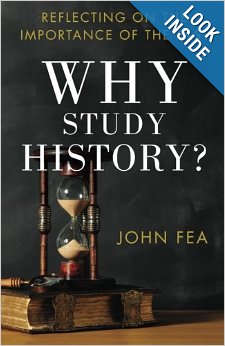posts
|
I’m glad that I took some time this week to read John Fea’s Why Study History: Reflecting on the Importance of the Past. Fea is chair of the history department at Messiah College, author of Was America Founded as a Christian Nation, and is a prolific blogger.
Fea’s book is well-written and inviting and fulfills his own admonition that historians should connect with a broader audience outside of the academy, including the church. This book is great for history students to get a sense of historiography, including how the discipline has developed through the centuries. In his discussion on what historians do, he shows how some historians see their work as merely striving to accurately report the past, while others have no problem evaluating history from a moral grid. Ultimately, Fea succeeds in showing how history can be done Christianly. I will limit my highlights to four areas: 1. His admonition to students to embrace the “Five Cs” of historical thinking: · Change over time—historians acknowledge that the past and present (and their peoples) are not the same. · Context—cultural and historical contexts must understood for accurate interpretation and sources must be read in context. · Causality—understanding what events and conditions shape others. · Contingency—understanding the role of human choices in shaping history. · Complexity—that the past is a "foreign country" and we must carefully engage the past on its terms. 2. Christian theology helps us in history. Realizing that man is created in the image of God helps us to do history by giving dignity to all peoples and keeps the historian from a triumphal, ethnocentric view of the past. Grasping the doctrine of sin also helps to make sense of the violence and atrocities that have occurred throughout history. 3. While on one hand, historians must strive to accurately and objectively relate the past, the Christian historian’s worldview—informed by such doctrines as providence, the incarnation, and the image of God—can contribute to the work of history. This perspective is really not new and can be traced back to Augustine's philosophy of history in his City of God. 4. Finally, Fea makes a good argument that the study of history (and the rest of the humanities) helps produce critical thinkers who can read, research, evaluate sources, and think outside of the box—qualities attractive to many employers today. In chapter 8, (“what do you do with a history major?”) Fea highlights some of his history students who have gone into business, medicine, ministry, humanitarian work and other non-teaching fields because of their training. Fea also engages this question regularly on his blog. In sum, this is a helpful book that has grown out of Fea’s teaching of undergraduate history. He has succeeded in showing the relevance of history for students of all majors and also for Christians in general. Comments are closed.
|
Archives
November 2023
|

 RSS Feed
RSS Feed
